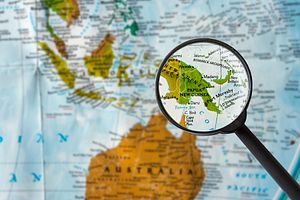On Wednesday morning police in Papua New Guinea fired on university students who were organizing a march from their campus to the parliament building. The march was an attempt to demand a formal state investigation into allegations that Prime Minister Peter O’Neill is corrupt.
Initial reports stated that 4 students had been killed in the gunfire. However, this is now being disputed by the Papua New Guinea government.
Leading up to the police gunfire, thousands of students at the University of Papua New Guinea in the capital of Port Moresby had been protesting and boycotting classes for several weeks amid significant political unrest.
Since the gunfire at the university, there have been reports of rioting and looting in in the Highland cities of Goroka and Mt. Hagen, as well as in Lae on the north coast.
The corruption allegations against O’Neill have been floating around the Prime Minister for over two years now. The core allegation is that the Ministry of Finance paid a $30 million in fraudulent legal bills to the law firm Paraka Lawyers. It is also alleged that the Prime Minister himself authorized some of these payments.
Paul Paraka, the head of the law firm was arrested in 2013; however, he has yet to be charged with any crime. Without a resolution in this matter, the controversy around these payments has remained highly prominent within the country.
PNG’s opposition made its fourth unsuccessful attempt this week to unseat O’Neill’s government via a no confidence vote. While the parliamentary motion was again shut down by the Speaker, it did gain some support from members of the Prime Minister’s own party. This acknowledgement by some members of the party, indicates that the tide may be turning on O’Neill.
There has been a significant shift from optimism to despair within the country. Last year the Asian Development Bank predicted PNG would be the fastest growing economy in 2015 with a GDP growth rate of over 21 percent (albeit from a low base). However, PNG’s reliance on natural resources means that the current downturn in the price of commodities is having a dramatic effect on the economy.
An extended drought broke earlier this year, but was succeeded by heavy rains and flooding that caused mudslides, affecting agricultural production. Leading to the United Nations to add PNG to the list of countries it believes may require food aid.
These natural phenomenon only compound the sense of despondency within the country.
A faltering economy and a political corruption scandal feed into the present global narrative that elites have gamed the system to their advantage at the expense of those without advantageous connections.
Most countries have their overzealous students–filled with ideals and ambition–who demand perfection from their governments. However, when student idealism and mainstream public sentiment align, it is a canary in the coal mine for a government’s status. A government that decides to use its coercive arm to violently suppress this public discontent tends to lose its legitimacy fairly quickly. In a country with weak law and order and multiple centers of tribal allegiance, the ability for a government to maintain stability, and structure, can decline quickly.
As Papua New Guinea’s closest partner, Australia will be paying close attention to the situation as it unfolds. Australia’s foreign minister, Julie Bishop, made a statement that she is aware that students have been shot, but the Australian High Commission in Port Moresby is trying to determine the details of any deaths and injuries.
“We call on all sides for calm to deescalate the tensions and certainly call on all sides to respect the peaceful and lawful right to protest.”
“There are about 70 Australian Federal Police (AFP) officers in PNG spread throughout the country and our High Commission will be working with the Australian AFP who are there to monitor the situation and keep me and keep the Australian Government informed,” she said.
The outside world has yet to intrude into Australia’s election campaign, but were the situation to escalate and order deteriorate further, Australia may be called upon to restore stability as they did in the Solomon Islands in 2003. To forestall such a response, the Australian government may urge O’Neill to step down.

































